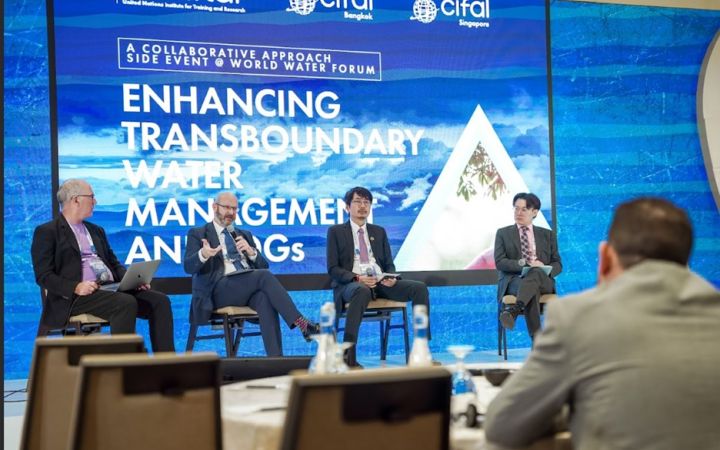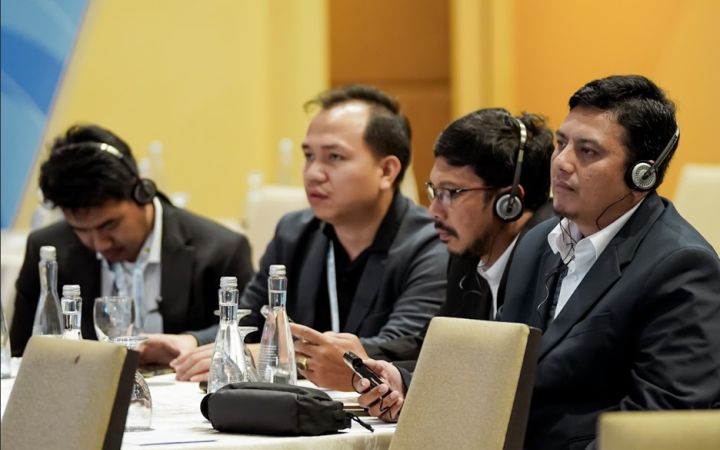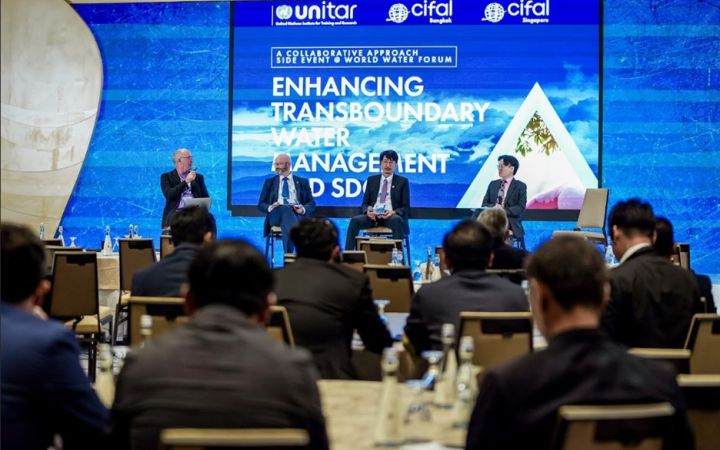21 May 2024, Bali, Indonesia – UNITAR’s Global Water Academy (UGWA) proudly hosted the side event entitled ‘Enhancing Transboundary Water Management and SDGs: A Collaborative Approach’ in collaboration with CIFAL Singapore (Nanyang Technological Institute), and CIFAL Bangkok (Asian Institute of Technology) at the World Water Forum (WWF) in Bali, Indonesia.
The side event aimed to bridge two critical aspects of global water challenges: transboundary water management and the United Nations Sustainable Development Goals (SDGs), particularly SDG 6. This aligns with the overarching vision of UNITAR’s Global Water Academy (UGWA) to identify capacity gaps hindering the effective implementation of SDG 6 targets and co-create innovative solutions to address them.
UGWA partners, including Nanyang Technological University (CIFAL Singapore) and the Asian Institute of Technology (CIFAL Bangkok), discussed capacity gaps by leveraging data-driven strategies and interdisciplinary collaborations. The event highlighted the importance of hydro diplomacy, innovative engineering solutions, and inclusive governance mechanisms in achieving shared water prosperity, with a particular focus on Southeast Asia. The session underscored the urgency of climate change impacts on water resources and explored actionable solutions to water scarcity, pollution, and equitable access.
The event was moderated by Dr Adam Switzer - Professor of Coastal Science, Asian School of the Environment, Nanyang Technological University; Director, CIFAL Singapore; Associated Fellow, UNITAR
Panelists present at the Event:
- Dr Thanapon Piman - Senior Research Fellow, Stockholm Environment Institute Asia Center in Thailand
- Dr. Dominique Berod - Head of the Earth System Monitoring Division, World Meteorological Organization Secretariat
- Prof. Chong Tzyy Haur - Associate Professor, School of Civil and Environmental Engineering, Nanyang Technological University
- Dr. Sangam Shrestha - Dean, Director, School of Engineering and Technology / Global Water Sanitation Center, Asian Institute of Technology (Honourable Mention, although absent.)
In a dynamic Q&A-style session, Dr. Adam Switzer hosted this distinguished group of experts. Through invigorating questions and in-depth discussions, the panellists shared their perspectives on the critical role of data-driven strategies and cross-sectoral collaborations in addressing water scarcity and ensuring sustainable water management. This session contributed significantly to the broader dialogue on achieving SDG 6, highlighting the importance of integrated approaches and innovative solutions. The conversation underscored the need for political will, effective data sharing, and inclusive governance to enhance water security and resilience, especially in Southeast Asia. Below are some of the questions and highlighted responses from the Q&A.
Questions
Q: How do you think we can get a better and enhanced understanding, a data-driven understanding, for strategies that are scalable to try and get towards sustainable water management in Southeast Asia?
A: (Prof. Chong Tzyy Haur) “So as we know, Singapore is a water-scarce country. We don't have natural resources, so we have to rely on technologies to supply our daily use water… It is important to collect all this data and use machine learning to see how resilient our technologies are under extreme conditions caused by climate change.”
A: (Dr. Thanapon Piman) “To enhance transboundary cooperation, sharing data is the first step. No sharing, no cooperation.”
A: (Dr. Dominique Berod) “Sharing data is key, and that's what WMO is doing with the unified data policy for all domains of the Earth system. However, you cannot share data if you do not collect it… Effective data collection is costly for many countries, so we need to find ways to be more efficient and leverage data for multiple purposes.”
Q: What can we do to improve cross-sectoral collaboration and partnerships?
A: (Dr. Dominique Berod) “We need to better connect data monitoring systems to the overall socio-economic and environmental challenges of a country, basin, or region. This involves building a value chain from data to decision-making and ensuring sustainable monitoring systems.”
A: (Prof. Chong Tzyy Haur) “Water is for all, so it's important to ensure equal access to water for everyone… Recognizing the purpose of forums like this, which focus on water, helps in forming collaborations and sharing data.”
Q: What is the biggest challenge to achieving SDG6 in the next 5 to 10 years?
A: (Dr. Thanapon Piman) “There is a noticeable gap between urban and rural areas, with urban areas receiving more development and investment. It's crucial to bring the voices of marginalized groups to the forefront and make them visible. SEI mainstreams gender equity and social inclusion in its projects to address these issues holistically.”
A: (Prof. Chong Tzyy Haur) “In Singapore, companies registered on the stock exchange must submit ESG reports, showing their commitment to sustainability. This holistic approach integrates social, financial, and environmental aspects.”
A: (Dr. Dominique Berod) “The challenges will grow in the next 5 to 10 years. The obvious answer is we need money, but money won't come from the sky… Building trust and ownership at the local level ensures sustainable funding and capacity, extending beyond 2030.”
Q: What can we learn from Singapore that can be scaled up or down for other cities in Southeast Asia?
A: (Prof. Chong Tzyy Haur) “Singapore's approach to sustainable cities involves looking at integrated issues rather than isolated ones. The Singapore Green Plan 2030 aims for net-zero targets through high-level planning and cross-sectoral collaboration.”
Q: Can you expand on the successes and challenges of Mekong River collaborative efforts over the past 10 years, particularly in the last 5 years?
A: (Dr. Thanapon Piman) “Local communities along borders do not see the political boundaries, but rather a shared society. It's essential to understand their needs and use different approaches for different scales to address water resource management effectively.”
Q: What's next for the WMO? Is it AI, data science, or big data? What’s the 5 to 10-year plan, and how will WMO change the way we look at water globally?
A: (Dr. Dominique Berod) “AI and data science are crucial for the future...Building a value chain from data to decision-making and fostering collaboration among all disciplines will drive progress."
Near the end of the event, the floor was opened to questions from the audience to ask more focused and specific questions to our panellists. These questions and answers highlighted some of the importance of bilateral discussions for transboundary water management as well as capacity building for water in communities that don’t have internalized funding mechanisms.
Q: Enhancing transboundary water management involves discussions, but bilateral discussions can be challenging. How can we set up effective bilateral discussions? Also, in urban slum areas, people often lack the capacity to pay for water and sanitation services. Is there any experience from the panellists in providing subsidies or alternative solutions for these communities?
A: (Prof. Chong Tzyy Haur) “In Singapore, larger users pay more based on a tax system. Industries using large amounts of water pay higher taxes, which include wastewater treatment charges. This helps build infrastructure and ensures that local communities benefit.”
A: (Dr. Thanapon Piman) “To address bilateral discussions, it's important to establish common interests and goals. For example, addressing climate change or flood and drought management can be a shared goal.”
A: (Dr. Dominique Berod) “Cooperation involves three key components: policy, technical solutions, and building trust. Building trust is essential, and showing the benefits of data sharing, such as improved flood forecasting, helps. It's important to have clear requirements and maintain dialogue among all stakeholders.”
Concluding Remarks
In closing, the session emphasized the critical nexus between transboundary water management and the SDGs, particularly SDG 6. The event highlighted the importance of cross-sectoral collaboration and partnerships to accelerate progress on sustainable water management practices, especially in Southeast Asia. By leveraging scientific expertise, engineering ingenuity, and policy advocacy, the session aimed to inspire actionable initiatives and policy reforms to address water challenges and promote shared water prosperity.
The dynamic discussions and presentations underscored several key points from our esteemed speakers. Prof. Chong Tzyy Haur emphasized the necessity of common interests, recognizing climate change impacts, and the pivotal role of education and training in data sharing and achieving common goals. Dr Thanapon Piman highlighted the importance of political will, enhancing data sharing across borders, and adopting an inclusive, holistic approach to build trust and ownership among stakeholders. Finally, Dr. Dominique Berod stressed the need to communicate the importance of data to decision-makers and the public, making monitoring systems visible and demonstrating their socio-economic benefits through a multi-disciplinary approach.
Collectively, these insights reinforce UGWA and its partners' commitment to fostering climate-resilient water management practices that ensure no one is left behind. The event concluded with a call to action for continued collaborative efforts and innovative solutions to achieve the SDG 6 targets and enhance global water security.
For further information regarding the UGWA side event at the World Water Forum, we welcome you to watch the video




